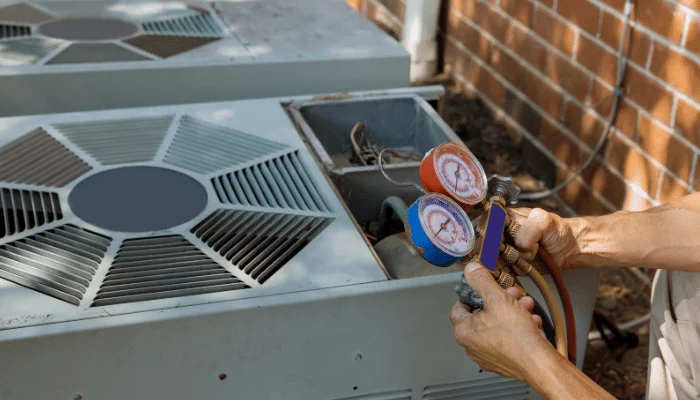For any business, ensuring that the environment remains comfortable and conducive to productivity is crucial. One of the key elements in maintaining this environment is a functioning HVAC (heating, ventilation, and air conditioning) system. In commercial settings, an HVAC system plays a vital role not just in comfort but in the overall efficiency of the workplace. Ignoring the HVAC system malfunction can cause bigger issues. Timely commercial HVAC repair is essential for smooth business operations, and here’s why.
Preventing Disruptions In Business Operations
A malfunctioning HVAC system can create significant disruptions in a business’s daily activities. A business environment that’s either too hot or too cold can make employees uncomfortable, leading to decreased productivity. The same discomfort affects customers and clients, especially in industries like retail, hospitality, and offices. If staff or consumers are uncomfortable due to poor air quality or excessive temperatures, it might hurt business.
For instance, if a commercial building’s HVAC system fails in the middle of summer, employees may struggle to focus in a stiflingly hot office. Similarly, in the winter months, employees might find it difficult to work in cold conditions. This leads to reduced efficiency, more breaks, and ultimately a loss in revenue.
Energy Efficiency And Cost Savings
One of the most important reasons for timely commercial HVAC repairs is to maintain energy efficiency. HVAC systems that are not functioning properly often consume more energy. For instance, a system that has worn parts or obstructed air ducts may work harder to reach the target temperature. As a result, it will consume more energy than necessary, increasing utility bills and operating costs.
By addressing repair issues early, businesses can ensure that their HVAC system are running as efficiently as possible. This not only saves money on energy costs but also extends the lifespan of the equipment. Maintenance and fast repairs can avoid system deterioration and save money on replacements.
Improved Indoor Air Quality
Air quality in commercial settings is crucial. Employees may take sick days due to respiratory disorders, weariness, and discomfort caused by poor indoor air quality. This affects the overall productivity of the business.
A malfunctioning HVAC system may have issues such as clogged filters, leaks, or poor ventilation. These concerns can reduce airflow and increase dust, mold, and germs. Timely repairs ensure that filters are clean, air ducts are sealed, and the system is functioning properly to provide clean, fresh air. This improves staff and consumer wellness, benefiting business operations.
Avoiding Expensive Repairs And Replacements
Many business owners put off HVAC repairs thinking they can handle the problem later, only to find that the situation worsens, leading to more severe damage. Clogged air filters and thermostats can rapidly become pricey issues. For example, a minor refrigerant leak can cause the system to freeze, damaging the compressor, which is one of the most expensive components to replace.
When repairs are neglected, the problem can snowball, causing additional wear on other parts of the system. A small, relatively inexpensive repair can escalate into a costly replacement of the entire HVAC unit. Timely repairs help businesses avoid these larger, more expensive fixes by addressing issues before they cause significant damage.
Compliance With Health And Safety Regulations
Depending on the industry and location, businesses may be required to comply with various health and safety regulations related to HVAC systems. For example, certain regulations mandate that commercial spaces maintain proper ventilation to ensure a safe environment for employees and customers. Not having a working HVAC system can lead to violations of these standards and fines or business closures.
Timely HVAC repairs ensure that businesses stay in compliance with local and national regulations. Businesses can avoid legal concerns and provide a safe, comfortable space for employees and consumers by maintaining the system.
Enhancing The Lifespan Of The HVAC System
Like mechanical equipment, HVAC systems benefit from regular maintenance and repairs. When a system is well-maintained, with minor issues addressed promptly, it is less likely to experience major breakdowns. Businesses can avoid the high cost of premature replacements by investing in timely repairs and ongoing maintenance.
The lifespan of an HVAC system varies depending on its quality, usage, and maintenance. On average, a well-maintained system can last anywhere between 10 and 20 years. However, systems that are frequently neglected or poorly maintained may only last a fraction of that time, costing businesses more in the long run.
Conclusion
For businesses, HVAC systems are more than just tools for climate control; they are critical to the comfort, health, and productivity of employees and customers. HVAC systems must be repaired promptly to avoid disruptions, energy expenses, air quality issues, and costly repairs or replacements. By prioritizing regular maintenance and addressing issues as soon as they arise, businesses can keep their operations running smoothly, ensuring both employee satisfaction and a positive customer experience.
